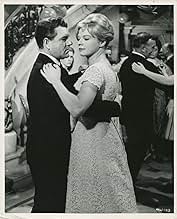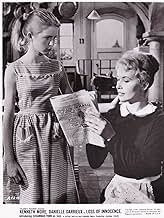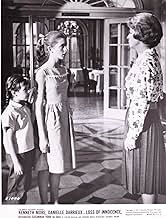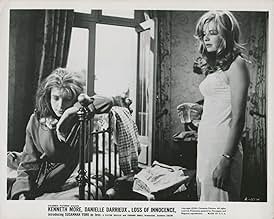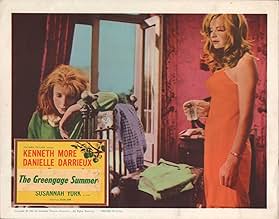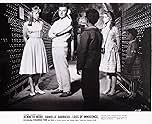AVALIAÇÃO DA IMDb
6,7/10
624
SUA AVALIAÇÃO
Adicionar um enredo no seu idiomaTeenage Joss Grey vacations in France with her family. Her mother falls ill, leaving her in the care of a hotel manager having an affair with a charming older man towards whom Joss develops ... Ler tudoTeenage Joss Grey vacations in France with her family. Her mother falls ill, leaving her in the care of a hotel manager having an affair with a charming older man towards whom Joss develops an attraction, transitioning from girl to woman.Teenage Joss Grey vacations in France with her family. Her mother falls ill, leaving her in the care of a hotel manager having an affair with a charming older man towards whom Joss develops an attraction, transitioning from girl to woman.
- Direção
- Roteiristas
- Artistas
Raymond Gérôme
- Renard
- (as Raymond Gerome)
André Maranne
- Monsieur Dufour
- (as Andre Maranne)
Harold Kasket
- Monsieur Prideaux
- (as Harold Kaskett)
Jacques B. Brunius
- Monsieur Joubert
- (as Jacques Brunius)
Will Stampe
- Monsieur Armand
- (as Will Stamp)
Jacques Dhéry
- Bargee
- (as Jacques Dhery)
Avaliações em destaque
This movie is my husband's favorite. He, the consummate movie buff, describes this movie as "nearly perfect" and "simply beautiful."
We have been searching for a copy of it for quite literally a decade. It does not appear to have ever been issued on videotape and it never appears on television, either.
If any of you just happen to know someplace where this wonderful movie might be available, please contact us!
We have been searching for a copy of it for quite literally a decade. It does not appear to have ever been issued on videotape and it never appears on television, either.
If any of you just happen to know someplace where this wonderful movie might be available, please contact us!
The alternative title for this film is The Loss of Innocence, which sounds deceptively exploitative. It is however an appropriate description of a charming yet sinister film.
The film is set in the Champagne Country in France, so we get some lush views of the French countryside and even a look into the champagne caves. That alone would probably be enough for some people but we have a great story too: four children (for those who read the book, the character of Cecil has been merged with Hester) are left on their own in a grand hotel in France when their mother gets taken ill. Thirteen-year-old Hester, the second eldest, takes charge of The Littles (their name for the two young children) as she has the best knowledge of French, but it is the eldest child, sixteen-year-old Joss, that blossoms almost overnight. Her beauty captures the heart of their unofficial guardian, middle-aged Englishman Eliot, and Joss soon becomes entangled in a love triangle between her, Eliot, and co-owner of the hotel, Madame Zizi. Further complications arise when Eliot proves himself to be untrustworthy, perhaps even criminal...
The novel has been diluted in the transition to film. The novel's equivalent of Hester, Cecil, is the narrator of the novel, so we see her sister's sexual awakening through her eyes. Cecil also undergoes a transition into womanhood, however all hints of this are eradicated in the film. Whether this is due to time restrictions or trying to please the censors is unclear. The focus of the film is on Joss and her coming-of-age. Fans of the book may be disappointed that Susannah York does not have the exotic dark beauty that Joss is supposed to have, but she is suitably pretty and passes as a sixteen-year-old who is just turning into a woman. She also resembles Sue Lyon in Lolita, which came out in the same year, and the two films have some similarities in that relationship. Kenneth More is a bit old to play Eliot so one might have to stretch their imagination to believe that Joss fancies him. He also doesn't have the suaveness or mysteriousness of Eliot in the novel. However he does have a chirpy charm and works well with the children. A mention should also go to Jane Asher, who plays Hester's curiosity of the adult world very effectively.
Although the film does not capture the darkness and perfection of the novel, it remains a nice exploration of the process of growing up.
The film is set in the Champagne Country in France, so we get some lush views of the French countryside and even a look into the champagne caves. That alone would probably be enough for some people but we have a great story too: four children (for those who read the book, the character of Cecil has been merged with Hester) are left on their own in a grand hotel in France when their mother gets taken ill. Thirteen-year-old Hester, the second eldest, takes charge of The Littles (their name for the two young children) as she has the best knowledge of French, but it is the eldest child, sixteen-year-old Joss, that blossoms almost overnight. Her beauty captures the heart of their unofficial guardian, middle-aged Englishman Eliot, and Joss soon becomes entangled in a love triangle between her, Eliot, and co-owner of the hotel, Madame Zizi. Further complications arise when Eliot proves himself to be untrustworthy, perhaps even criminal...
The novel has been diluted in the transition to film. The novel's equivalent of Hester, Cecil, is the narrator of the novel, so we see her sister's sexual awakening through her eyes. Cecil also undergoes a transition into womanhood, however all hints of this are eradicated in the film. Whether this is due to time restrictions or trying to please the censors is unclear. The focus of the film is on Joss and her coming-of-age. Fans of the book may be disappointed that Susannah York does not have the exotic dark beauty that Joss is supposed to have, but she is suitably pretty and passes as a sixteen-year-old who is just turning into a woman. She also resembles Sue Lyon in Lolita, which came out in the same year, and the two films have some similarities in that relationship. Kenneth More is a bit old to play Eliot so one might have to stretch their imagination to believe that Joss fancies him. He also doesn't have the suaveness or mysteriousness of Eliot in the novel. However he does have a chirpy charm and works well with the children. A mention should also go to Jane Asher, who plays Hester's curiosity of the adult world very effectively.
Although the film does not capture the darkness and perfection of the novel, it remains a nice exploration of the process of growing up.
Susannah York is astonishingly good as a sixteen-year old British girl, traveling through France with her mother and three younger siblings, who falls in love for the first time with a handsome, older man (Kenneth More) harboring a guilty secret. The kids, who are left temporarily without their mum after she takes sick, arrive at their hotel in France's Champagne Country to an ill-wind: the two lesbian women who run the extravagant spread do not permit children, but one of the ladies is also involved with More and he takes the family under his wing. The complex relationship between the women--business partners who appear to have a great deal of history together-- is handled without high drama (indeed, Howard Koch's writing is so subtle that the depth of these characters may elude some viewers). The children get to stay, and everyone falls in love with dashing More, but with crystal-eyed Susannah there's bound to be heartbreak--and in that heartbreak, jealousy and a child's vindictiveness. A fully thought-out and realized film-adaptation of Rumer Godden's novel, played out amongst a gorgeous backdrop. The movie has a precocious nature and a wise child's sensibility--very little of the drama is hammered out for us--and the tone of the picture is kept dreamy-romantic. It is exceptionally well-performed, and given a sensitive direction from Lewis Gilbert that ably steers viewers through the complicated narrative to the story's poetic finish. *** from ****
Greengage Summer (Loss Of Innocence, American release title) is a wonderful, nostalgic movie that I love to watch over and over again. How can you improve upon Kenneth More looking over at a blossoming Susannah York in one of her first films, tasting the perspiration on her face and saying sweetly: "Dew of Joss"? Sigh. So romantic!
The performances of all the children are first rate, and the actor who plays Paul is perfectly slimey for his part. You can almost smell him through the tv screen! In the novel by Rumer Godden I think there were two more children than in the movie, but who's counting? Best scenes: the French countryside, the sightseeing tour to the church, winery and the cafe, the dance scene at the hotel, and Eliot saying goodbye to Joss at the end. The movie also boasts rather gorgeous music that is available on CD. Check it out. I sounded out the main theme and play it on my piano quite often.
They just don't make films like this anymore, and if they tried to they would have the main characters in bed together in the first five minutes. Yuck. Give me yesterday, and understated romance over the tripe they call entertainment today.
The performances of all the children are first rate, and the actor who plays Paul is perfectly slimey for his part. You can almost smell him through the tv screen! In the novel by Rumer Godden I think there were two more children than in the movie, but who's counting? Best scenes: the French countryside, the sightseeing tour to the church, winery and the cafe, the dance scene at the hotel, and Eliot saying goodbye to Joss at the end. The movie also boasts rather gorgeous music that is available on CD. Check it out. I sounded out the main theme and play it on my piano quite often.
They just don't make films like this anymore, and if they tried to they would have the main characters in bed together in the first five minutes. Yuck. Give me yesterday, and understated romance over the tripe they call entertainment today.
I'm surprised to find that this has not as yet been given a video release. More and more films from the various studios' archives are finding their way to a public that craves the kind of entertainment which was once much more available to those willing to attend a film in a theatrical setting, that is, films with a respect for adult sensibilities and without the tiniest nod to the sensation-seekers who crave explosions, mindless (and excruciatingly extended sequences of) violence and special effects which are, let's face it, beginning the inevitable downward spiral of diminishing returns. Really! Are any but those who refuse to refine their tastes in theater, films, etc., still impressed by the ever more astonishing demonstrations of the computer geniuses' craft and which are the reason that dozens and dozens of artisans make a closing credit roll-up almost as long as a typical film these days (and which precious few theater patrons will now sit through)?
I was able to see "Loss of Innocence" (its American release title) at a first-run theater in Beverly Hills, California and the print was absolutely pristine, doing full justice to Freddie Young's exceptionally fine work behind the Technicolor cameras. A projectionist of my acquaintance at the time told me that Columbia Pictures Corporation was especially particular about the condition and presentation of first-run films released by that studio, sending technicians frequently during first-run engagements of Columbia films to check on the condition of projection equipment, correcting any flaws that may have shown up in the reels, the proper masking of projected films according to the aspect ratio used in production, and so forth. I no longer live in southern California but I'm somewhat reluctant to believe that such care (and expense) is still lavished on films at first-run houses down there these days. It certainly doesn't appear to be true here in the Northwest.
Anyway, with the lovely scenery of its French countryside settings and two truly beautiful actresses (the exquisitely young English rose, Miss York, and that elegant flower of French womanhood, Madame Darrieux) to delight one's eyes, plus a delicately scripted story of more than unusual interest, this is a film I shall always remember as one of the most ravishing cinema-going experiences that I can recall. I join others who have commented on this site in hoping that we will one day be rewarded with a happy refreshing of our memories with a video release of this gem.
I was able to see "Loss of Innocence" (its American release title) at a first-run theater in Beverly Hills, California and the print was absolutely pristine, doing full justice to Freddie Young's exceptionally fine work behind the Technicolor cameras. A projectionist of my acquaintance at the time told me that Columbia Pictures Corporation was especially particular about the condition and presentation of first-run films released by that studio, sending technicians frequently during first-run engagements of Columbia films to check on the condition of projection equipment, correcting any flaws that may have shown up in the reels, the proper masking of projected films according to the aspect ratio used in production, and so forth. I no longer live in southern California but I'm somewhat reluctant to believe that such care (and expense) is still lavished on films at first-run houses down there these days. It certainly doesn't appear to be true here in the Northwest.
Anyway, with the lovely scenery of its French countryside settings and two truly beautiful actresses (the exquisitely young English rose, Miss York, and that elegant flower of French womanhood, Madame Darrieux) to delight one's eyes, plus a delicately scripted story of more than unusual interest, this is a film I shall always remember as one of the most ravishing cinema-going experiences that I can recall. I join others who have commented on this site in hoping that we will one day be rewarded with a happy refreshing of our memories with a video release of this gem.
Você sabia?
- CuriosidadesSeveral years after Kenneth More's death, both Lewis Gilbert and Susannah York said in interviews that More had been miscast in this film and that Dirk Bogarde would have been better in the role. However, More wanted very much to be in the film, precisely because the role would be an unusual one for him, and, nearing his fifties, he wanted to change his movie image and find more complex and mature parts.
- Cenas durante ou pós-créditosOpening credits prologue: IN THE GREEN AND GOLD CHAMPAGNE COUNTRY OF FRANCE
- ConexõesFeatured in Talkies: Remembering Kenneth More: Part One (2019)
Principais escolhas
Faça login para avaliar e ver a lista de recomendações personalizadas
- How long is Loss of Innocence?Fornecido pela Alexa
Detalhes
- Data de lançamento
- País de origem
- Idiomas
- Também conhecido como
- El fin de la inocencia
- Locações de filme
- Gare SNCF, 28 Boulevard de Verdun, Béziers, Hérault, França(Madame Zizi steps out of the train)
- Empresa de produção
- Consulte mais créditos da empresa na IMDbPro
- Tempo de duração1 hora 39 minutos
- Mixagem de som
- Proporção
- 1.33 : 1(original ratio)
Contribua para esta página
Sugerir uma alteração ou adicionar conteúdo ausente

Principal brecha
By what name was Fruto de Verão (1961) officially released in Canada in English?
Responda
